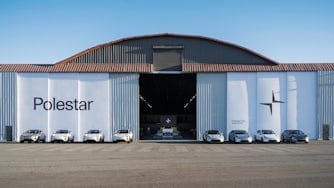Polestar and Bcomp
Every so often, science fiction becomes science fact.

Blending technology and living materials is an age-old science fiction idea. So is replacing the mechanical with the biological. Occasionally, something from sci-fi is not only possible to replicate in real life, but also incredibly useful. Like the materials made by Bcomp.
Based in the Swiss city of Fribourg, Bcomp is a “natural fibre composite innovator” which has been producing sustainable materials for a variety of applications since 2011. What makes this a science-fiction-in-real-life story is that they’re made from organic fibres. We’ve teamed with Bcomp in order to make use of two of their game-changing composites.

The first of these materials is ampliTex™, made from woven flax fibres. When used in the interior of a car, for example, it reduces both vibrations and overall weight, while acting as a visual layer. The fibres are processed mechanically as opposed to chemically, and flax itself is much less taxing on soil than other crops.
The second is powerRibs™, also made from flax. Inspired by the vein structures of leaves, they form a 3D structure on the back of a panel which drastically increases the panel’s strength and stiffness. This allows the panel itself to be thinner than if it were made of a more traditional material, cutting down both weight and material amount. It reduces vibrations by a whopping 250%. It can even behave better in a crash situation when compared with more conventional materials.
Ground-breaking materials made from organic components used to only be found in the far future of science fiction. Soon, they could be found in a Polestar.


